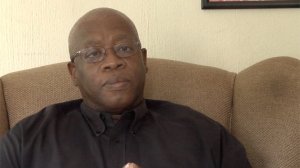Ayear ago, the African National Congress (ANC) held its centenary national conference in Mangaung, where President Jacob Zuma won the battle for the presidency of the ruling party by a wide margin. Proceedings at the national conference defied the expectations of what many thought and others hoped would be a bruising factional battle. Contrary to these expectations, the ANC, at the end of the Mangaung conference, was more united behind Zuma than it had been in Polokwane. Was Mangaung the calm before the storm? Or are events in the ANC and the alliance as a whole building towards a storm in a calabash?
Barely a year after what was a successful conference for the President, the ANC seems to be losing both the plot and the book in which it is contained, the Congress of South African Trade Unions (Cosatu) is doing every- thing in its power not to avert a split and the South African Communist Party has become more sycophantic than a tenderpreneur hungry for the attention of a powerful politician. In short, the alliance is a mess.
So, what if the alliance is a mess?
Let us start by stating the obvious. The alliance, despite its problems, is still the most POWERFUL political force in South Africa. The leader of the alliance, the ANC, may lose some electoral support in the 2014 general election, but it will, for some time, remain dominant over our political landscape. The question is whether the ANC has the capacity to arrest the internal decline which, since June 2005, has been one of the most dominant political realities in our country. If factional warfare, latent and otherwise, has compromised its strategic capacity, I have no doubt that both Cosatu and the ANC will eventually split.
As OR Tambo once argued, the only force that can destroy the ANC is the ANC itself. In other words, its greatest enemies are within. However, in the same way that wealth does not change people but simply confirms pre-existing pathologies, it is possible that the 1994 demo- cratic breakthrough and the change in the relationship between the ANC and State power which followed it have simply revealed, in some ANC members and leaders, mutations of political morality that were hidden by the struggle against apartheid.
What this means in terms of the internal conflict between good and bad as part of the human condition was distorted during the struggle by a complete, and sometimes unrealistic, externalisation of all things bad, evil, immoral and venal to the apartheid State. The anti-apartheid struggle, therefore, pushed all things bad about freedom fighters to the periphery of the liberation struggle and to the core of apartheid as the embodiment of evil. What this masked is the fact that some in the ANC were captured by values and principles that are foreign and alien to the ANC long before the advent of democracy. So, the dawn of democracy was, to some extent, the moment when the sun rose in the sky to shine upon principles and values that were cherished during the struggle as their suns were setting in horizons of despair.
But the dawn of democracy exposed also weaknesses in leadership, character and courage that lay hidden in the darkest hour before the dawn of freedom. Put simply, the corruption, lack of leader- ship and lack of courage we see in the ANC and the alliance today are probably not new. Maybe they have always been, and will always be, directed outside their source. That the evil of apartheid made it difficult for us to either see or acknowledge them does not mean they did not exist. If they were hidden by the darkness of apartheid, what is hiding them now? In fact, the answer is contradictory. Unbridled self-interest, Orwellian manipulation and sycophancy are the enemies and dark forces within the ANC that have both been hidden (until recently) and exposed by the bright light of democracy. Frankly, some have been relying on the blinding effect the bright light of democracy has had on ANC member and nonmember alike – an effect that, until recently, has obscured that which is foreign to the ANC and alien to democratic culture.
These foreign and alien tendencies are not reducible only to the lapses in judgment on the part of the President and the failure of the leadership collective to manage his strengths and weaknesses in the interests of both country and party. And to the extent that there are pockets of discontent with the leadership of the President in his own party and the alliance, the question is whether the alternative is free – if it has not been captured already – from the clutches of those who read not from the Freedom Charter but from what, to paraphrase the lyrics of a song by Black Sabbath, is essentially the catechism of the ignoble and ignominious.
EMAIL THIS ARTICLE SAVE THIS ARTICLE
To subscribe email subscriptions@creamermedia.co.za or click here
To advertise email advertising@creamermedia.co.za or click here










